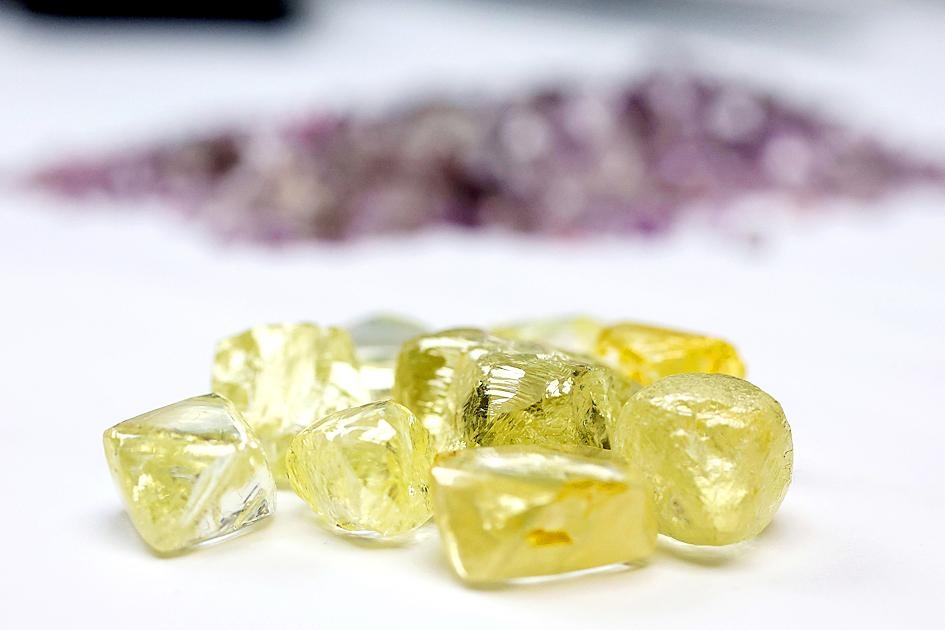In his small office in the Israel Diamond Exchange near the coastal city of Tel Aviv, Pravin Kukadia proudly presents his collection of precious stones.
Between Kukadia’s homeland, India, and his country of residence, Israel, diamonds have forged a key diplomatic and economic link — representing about US$1.5 billion a year and roughly half of all trade between the nations, diamond experts say.
Kukadia first came to Israel in 1996, but soon made regular visits to Israel as a buyer for his family business based in Surat in western India — where 90 percent of the world’s diamonds are cut and polished.

Photo: AFP
“At that time, I bought rough diamonds,” he said, carefully inspecting a particularly rare example, a rose-colored diamond. “I bought small sizes — my specialty was small and cheap.”
Today, the 56-year-old specializes in trading large stones.
In 2003, he moved with his wife and two children to develop his business in Israel, because it was “a major player in the diamond industry” and at the forefront of innovation in the field.
At that time, India “didn’t have the technology like here,” said Kukadia, who imported Israeli technology including laser-machines for his Indian operations.
The Israel Diamond Exchange is home to about 30 Indian companies, making India the foreign nation with the biggest number of firms on the bourse, Kukadia added.
Most Indian diamond families, about 80 people, live close to the diamond exchange in the city of Ramat Gan, and many stay in the same building.
“We are one and the same family,” Kukadia said.
Israeli immigration lawyer Joshua Pex said that Indian diamond traders enjoy a “special status” in Israel, aimed at promoting trade with India.
“Since 2018, they can work and live in Israel indefinitely, and bring their families,” Pex said. “They must renew their visas every three years, compared to two for diamond traders from other countries.”
The huge complex of the diamond exchange is also home to the State Bank of India, the only foreign bank present there, alongside two Israeli banks.
“The diamond industry’s trade with India accounts for about 50 percent of all general trade between Israel and India, representing US$1.5 billion per year,” Israel Diamond Exchange president Boaz Moldawsky said.
Israel sources raw stones from around the world, while many Indian companies specialize in polishing the rocks into gleaming gems.
“We export rough stones, and mainly import polished stones,” Moldawsky said.
While India recognized Israel in 1950, it has traditionally expressed support for the creation of a Palestinian state, and did not establish diplomatic relations with the Jewish state until 1992.
“Diamonds were one of the first commodities exchanged between Israel and India in the early 1970s,” Moldawsky said.
However, bilateral ties go beyond diamonds.
On Thursday, Israeli Minister of Defense Benny Gantz visited India as part of the 30th anniversary of official diplomatic links, where he urged a deepening of defense ties.
Israel sells about US$1 billion of military equipment to India a year.
Cooperation agreements have also multiplied in the fields of water systems, agriculture, health and solar energy.
Other commodities:
‧Gold for August delivery fell US$21.20 to US$1,850.20 an ounce, down 0.38 percent for the week.
‧Silver for July delivery fell US$0.37 to US$21.91 an ounce, declining 0.86 percent weekly, while July copper fell US$0.08 to US$4.47 a pound, but rose 3.71 from a week earlier.
Additional reporting by AP

Vincent Wei led fellow Singaporean farmers around an empty Malaysian plot, laying out plans for a greenhouse and rows of leafy vegetables. What he pitched was not just space for crops, but a lifeline for growers struggling to make ends meet in a city-state with high prices and little vacant land. The future agriculture hub is part of a joint special economic zone launched last year by the two neighbors, expected to cost US$123 million and produce 10,000 tonnes of fresh produce annually. It is attracting Singaporean farmers with promises of cheaper land, labor and energy just over the border.

US actor Matthew McConaughey has filed recordings of his image and voice with US patent authorities to protect them from unauthorized usage by artificial intelligence (AI) platforms, a representative said earlier this week. Several video clips and audio recordings were registered by the commercial arm of the Just Keep Livin’ Foundation, a non-profit created by the Oscar-winning actor and his wife, Camila, according to the US Patent and Trademark Office database. Many artists are increasingly concerned about the uncontrolled use of their image via generative AI since the rollout of ChatGPT and other AI-powered tools. Several US states have adopted

KEEPING UP: The acquisition of a cleanroom in Taiwan would enable Micron to increase production in a market where demand continues to outpace supply, a Micron official said Micron Technology Inc has signed a letter of intent to buy a fabrication site in Taiwan from Powerchip Semiconductor Manufacturing Corp (力積電) for US$1.8 billion to expand its production of memory chips. Micron would take control of the P5 site in Miaoli County’s Tongluo Township (銅鑼) and plans to ramp up DRAM production in phases after the transaction closes in the second quarter, the company said in a statement on Saturday. The acquisition includes an existing 12 inch fab cleanroom of 27,871m2 and would further position Micron to address growing global demand for memory solutions, the company said. Micron expects the transaction to

A proposed billionaires’ tax in California has ignited a political uproar in Silicon Valley, with tech titans threatening to leave the state while California Governor Gavin Newsom of the Democratic Party maneuvers to defeat a levy that he fears would lead to an exodus of wealth. A technology mecca, California has more billionaires than any other US state — a few hundred, by some estimates. About half its personal income tax revenue, a financial backbone in the nearly US$350 billion budget, comes from the top 1 percent of earners. A large healthcare union is attempting to place a proposal before